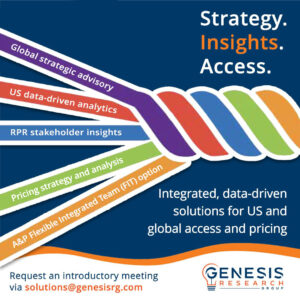In the rapidly evolving landscape of healthcare and pharmaceutical market access, data analytics has become a critical component for making informed decisions. We sat down with Ki Park, our Vice President of Market Access Strategy and Analytics, to discuss his journey into the field, industry insights, and how Genesis Research Group is positioned to help clients navigate complex market access challenges.
Could you introduce yourself and tell us a bit about your background?
I am Vice President of Market Access Strategy and Analytics at Genesis Research Group, having joined the company in July 2024.
I began my career as a sales representative at Merck and then transitioned into analytics at Allergan on their market access team, running their sales operations and analytics function. After four years, I moved over to Symphony Health as a practice consultant in market access eventually becoming a practice area leader. Over the subsequent fifteen years, I took on additional responsibilities around patient analytics, commercial effectiveness, and promotional effectiveness. Most recently, I took the role of Managing Principal, Market Access Strategy Consulting and Analytics at IQVIA, before transitioning to my current position leading market access analytics at Genesis.
Can you tell us a little bit about the nature of market access data analytics and its particular importance in the US market?
Data analytics in pharma/biotech market access uses data-driven insights to optimize pricing, demonstrate value to payers, and ensure patient access to medications. Key applications include analyzing real-world data for pricing strategies, understanding payer coverage and their ability to control utilization, tracking patient access patterns, forecasting market dynamics, and conducting health economics research.
In the US, this is particularly critical due to the complex, fragmented healthcare system with multiple private payers, each with their own formulary requirements and coverage policies, as well as the absence of centralized price controls. Unlike many global markets with single-payer systems and formal health technology assessment (HTA) processes, US market access requires sophisticated analytics to navigate the diverse payer landscape, complex rebate structures, and evolving value-based contracting arrangements.
What drew you to market access, and specifically to the analytics field?
I’ve always had an interest in the application of analytics. At Merck, I was doing a lot of district analytic work – helping my district team members identify pull through opportunities. Then, while I was working on my master’s degree, I honed my analytics skills, learning how to work with broader datasets.
At Allergan, I was running everything from Medicare Part D readiness, contracting analytics, sales compensation and pull-through initiatives. I had the opportunity to explore not only analytics but specifically market access. I remember a conversation I had with one of the account managers. He pulled me aside and said, “You’re in the right field—market access is the place to be in the next 10 to 20 years”. It really has played out that way.
Within market access, there are opportunities to figure out where competitive threats and potential opportunities are, and then to leverage these opportunities to make sure our clients are well positioned for potential policy changes. I really enjoy that challenge.
How did your interest in data analytics and market access lead you to Genesis Research Group?
I felt that Genesis was a great place for me to advance in my career and leverage my analytics capabilities with patient, provider, and payer level data, a discipline which really ties into the integrated work that Genesis is already doing to provide an even more comprehensive access and pricing solution for clients.
When I first joined Genesis, we started talking about what type of work we would be doing and I benefited from speaking to my real-world evidence (RWE) colleagues, a field in which Genesis Research Group has built a significant reputation. I discovered a lot of commonalities with different applications and research questions. The types of analytics they do is very similar. It’s the lens that you look through that’s different. In market access analytics, we look at it from the view of what impact payers have on overall access. What barriers do practitioners and patients face in accessing a particular product? What barriers are physicians willing to overcome to prescribe a specific product to a patient? How willing are patients to overcome those hurdles, and ultimately are they willing to pay their expected out-of-pocket cost?
So, my work is like RWE in many ways but views it from a payer and patient lens. This helps us understand how we can help our clients improve patient access to treatments and prepare them for what they might encounter from a contracting perspective.
Industry insights and challenges.
What’s the most significant change you’ve witnessed that impacts your field?
Over the years, there have been a lot of changes in terms of data visibility that have come down the pike. Either from manufacturers or health plans blocking visibility to specific data points, or physicians opting out of data visibility, data over the years has been challenging in terms of getting insights because there seem to be more holes in it.
It really is ultimately the vendor’s responsibility to understand what those gaps are, so it’s essential to have not only a deep understanding of what the underlying data sources are, but also the business rules that the vendors apply to it. Finding a person with that level of insight and skill to maneuver around those data gaps is critical to ensure that the results are as accurate as possible.
Does your work involve having to adapt to policy changes on a regular basis?
Absolutely. When I first started at Allergan, we needed to prepare for Medicare Part D. A lot of work was done trying to predict what might happen from a contracting perspective, as well as potential access and patient utilization patterns.
More recently, I found myself responding to a range of state level legislation business questions, such as accumulator bans or potential pass-through legislation, and trying to understand the impact. That poses a lot of opportunities for consulting agencies because as pharma manufacturers want to understand the implications of these policies, they need access to the right data sources, they need somebody to analyze that data and model out the various scenarios. Realistically, with any kind of legislation, be it state or federal, there will be a need to understand how that impacts the patients.
One of the most recent significant challenges has been the Inflation Reduction Act (IRA). Here at Genesis, we’ve had a lot of success helping clients prepare for its impact.
What is a common misconception about data analytics?
When you’re working with somebody who’s new to data analytics, it’s hard to convince them that data isn’t perfect. It is quite imperfect, and the part about understanding those imperfections and putting in business rules to fix them as close as possible is the key. I joke that when you’re doing analytics, you don’t want to work with accountants because they want everything to be perfect. And really, it never is.
Our role is to provide guidance and model out potential future aspects based on what we can see. By nature, the data is always going to be somewhat imperfect, but what we do is secure the best dataset by understanding the source, the strength and the gaps and then put business rules on top of it to create the most perfect dataset possible from the imperfect dataset.
The Genesis difference
How does Genesis Research Group’s approach help clients achieve their objectives?
Genesis Research Group is uniquely positioned in the market access space as we are not only able to bring in deep data-agnostic analytics but also have the ability—through our proprietary stakeholder network and ‘RPR’ engagement platform—to efficiently wrap around primary market research and understand what key stakeholders are thinking.
Data analytics can be used to understand the situation and predict the likelihood of an event to occur; however, it’s in combination with primary market research that we can uncover why payers act a certain way or what they plan on doing in future scenarios.
In one example, a client wanted to understand the impact of accumulators, maximizers, and alternative funding programs (AFPs) on various therapeutic areas and how potential legislation against these programs was going to impact future use of them. We not only leveraged the client’s data across multiple data sources but also received input from stakeholders, including national payers and pharmacy benefit managers (PBMs), key opinion leaders, advocacy groups, and employer groups.
Through data analytics, we were able to demonstrate the impact of these programs on patient utilization, and we were also able to get stakeholders’ thought processes on the usefulness of these programs, how they believe it impacts the patient, and how they are prepared for potential legislative actions against them. The client was delighted with the integrated insights we were able to provide.
What aspects of your work bring you the most satisfaction?
The ability to answer our clients’ questions and provide the insights they need to meeting their objectives is important to me. Also, the challenge I face every day in being able to keep up to date with policy changes and helping clients understand the impact of those changes.
The fact that every project is unique, and that there is no business question that’s the same as the previous one, is extremely gratifying. Most importantly, knowing we’ve produced the best possible work for our clients and helped their products get to those that need it quickly is perhaps the most satisfying.
To learn more about how Genesis Research Group’s market access analytics expertise can help your organization navigate complex healthcare challenges, contact us at solutions@genesisrg.com.
Explore our Access & Pricing solutions | Download our brochure | Sign up to our newsletter




